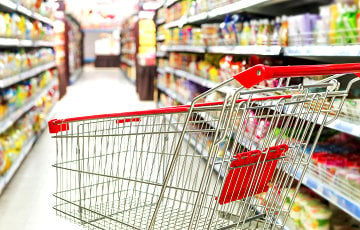Minsk Counter-Sanctions Went Up in Smoke?
9- 13.12.2021, 8:55
- 40,678

This whole adventure does not serve the regime favourably, but it can make a sensation.
Belarus has responded to the sanctions and banned the import of some products from hostile countries into its territory. Nevertheless, after a closer look, it turned out there was no ban. One can import subsanctioned products by special permission of Roman Golovchenko's government, says Nezavisimaya Gazeta.
The latest sanctions against Belarus were introduced last Friday. The Belarusian authorities immediately announced they would deliver a very tough response right after the weekend. The promised response was released by the government on Tuesday evening. It has a list of "banned goods," which includes meat (pork and beef), cheese, sausages, fruit, nuts, confectionery. The ban will come into effect on 1 January. Products from the EU, the USA, Canada, Norway, Albania, Iceland, Macedonia, the UK, Montenegro and Switzerland fall under the ban.
Along with the list of banned products from hostile countries, there is a provision on quotas, which suggests the import of a certain amount of banned products. The government will set the quotas and distribute them among importers. It is also allowed to import all the listed goods for personal use.
On Wednesday, counter-sanctions became the most popular topic among experts and the population, as far as consumer goods are concerned. Minister of Trade of Belarus Vladimir Koltovitch stated the country imported $2 billion worth of goods from the countries listed as hostile; only a quarter of this amount fell under the sanctions. The authorities have not banned infant formula and critical imports. According to the foreign trade balance, Belarus buys $5 billion worth of goods only in the EU.
Belarus has to respond to the sanctions pressure, said Koltovitch, which is not very pleasant for the population. The restrictions, according to his data, will affect more than 20 groups of goods. "It includes goods that are used both for production and sale in the retail trade network," explained Vladimir Koltovich.
According to him, these goods can be divided into three categories. "Goods which are fully substituted by domestic producers or production facilities located in the countries which are amicable for Belarus. Goods that are produced but not in sufficient quantity and the goods of the so-called critical import," said the Minister. He expressed hope that the buyers would not even feel the sanctions.
The Belarusian government simultaneously instructed the Ministry of Agriculture to provide the market with the banned products by purchasing them from "friendly" states. Deputy Minister of Agriculture and Food of Belarus Alexei Bogdanov assured that Belarusians would not feel the lack of goods. "Belarus has long been building up a policy to ensure food security using its own resources. We managed to do it for more than ten years ago," he states.
Experts, commenting on the government's decision, say it may indeed be that rare case when one can agree with the officials. Likely, nothing will disappear from the market because of such sanctions. Importers, many of whom will be cut off from the market, will feel it. Businessmen believe the right to supply sanctioned goods will be given to people close to the authorities. It will limit competition in the market and, therefore, lead to higher prices. "One thing is clear: it is forbidden to import, but it is allowed for some individuals," political analyst Pyotr Kuznetsov writes about the government's decision. The expert also draws attention to the fact that violators of the ban will only be punished with a fine (or will be forced to drive back). "Let's say, not a great measure when we are talking about the potential profits from a seriously supplied smuggling flow," the expert writes on his Telegram channel.
The government's sanctions decree will be in effect for six months, but no ban on selling off stocks is stipulated. "That is, under the threat of a 'cosmic' fine, one can continue to import, pretending to sell out stocks. But adding to the price costs, risks and... And the inevitable profit from increasing demand and decreasing supply," says Pyotr Kuznetsov. "Whoever wants a Snickers bar will buy it. Only maybe not at any bus stop anymore. And at a different price," sums up the expert.
Earlier, experts said that the openness and insignificance of the Belarusian economy had no persuasive leverage on the European partners, while the country itself was seriously dependent on them. The main export commodity is oil and oil products. The European sanctions against Belarus have not yet taken effect, although they have been adopted. At best, some impact will show itself early next year. Europe has also promised a sixth package. Therefore, Minsk will not benefit from "real" counter-sanctions. Nevertheless, it can make a sensation to demonstrate its strength, local observers comment on Belarus' response to Western countries.










